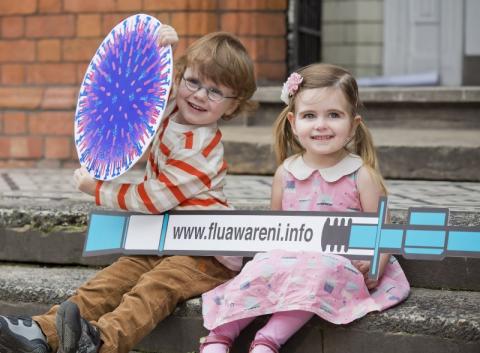Excellent start to children’s flu vaccine programme

The Public Health Agency’s (PHA) early flu vaccine uptake figures show that rates are high among the first two groups of children who are eligible to receive the vaccine this year.
The programme has been rolled out since the start of the month, with the vaccine being administered to children using a painless nasal spray. Children aged two and three years old and primary six children are eligible to receive the vaccine this flu season.
Figures show that the primary six group has achieved almost 80% uptake and many GP practices are already reporting uptake rates of 50 to 60% in their two and three year old group at this early stage in the campaign.
Dr Richard Smithson, Consultant in Health Protection at the PHA, said: “This is an excellent start to the campaign and the figures are very encouraging as they show that people are recognising how a simple spray up the nose can help protect children from flu.
“Many GP practices are still inviting children in and I would urge the parents of any two or three year olds who have not yet been vaccinated to join the many who have. If you haven’t heard from your GP practice yet, you can contact them to see what their arrangements are.”
The flu virus spreads easily and quickly through the air when people cough and sneeze without covering their nose and mouth, infecting both adults and children alike. Flu can cause the same unpleasant symptoms in children as it does with adults – fever, chills, aching muscles and joints, headache and extreme tiredness. These symptoms can last between two and seven days and for some people can lead to serious illness and result in a stay in hospital.
Dr Smithson continued: “Receiving the flu vaccine is the best way to help protect your child from the flu and we would encourage parents of two the three year old children to get their child vaccinated at their GP surgery. Also, if any primary six child missed getting the flu vaccine in school, they can still receive it through their local GP.
“Vaccinating them against this unpleasant and sometimes serious illness can also reduce the likelihood of the disease being passed on to other children or family members, some of whom may be at increased risk of being seriously ill from having the flu.”
Most children will receive the vaccine via a quick and painless nasal spray. The nasal vaccine is being used because it has been shown to provide greater protection for children than the flu injection.
All at-risk children should continue to receive the flu vaccine as they have done in previous years. For medical reasons, a very small number of children will not be able to receive the nasal spray, known as ‘Fluenz’. They will be offered the usual flu vaccine by injection instead. If unsure, speak to your GP for advice.
For more information about the flu vaccine for 2013/14, visit www.fluawareni.info or speak to your GP/nurse or member of staff within the school nurse team at your local Health and Social Care Trust.
A short video explaining how the new nasal vaccine works is available on the PHA’s YouTube channel at www.bit.ly/fluvid13
- Last year the Chief Medical Officer, Dr Michael McBride announced that the flu vaccination programme is to be rolled out to include all children between two and 16. This is to be done using phased introduction with the first groups being children age two and three years and primary six children.
- The groups were selected as they represent both models of delivery i.e. through GP practices and in schools. Younger children can also be sicker with flu so it was important to include the two and three year olds from the start.
- Two & three year old children on the 1 September 2013, (i.e. those born between 2 September 2009 and 1 September 2011) will receive the vaccination through their local GP surgery. Check arrangements with your surgery.
- Primary six children will receive the vaccination at school. Schools will be writing out to parents at the beginning of September. Parents will be asked to complete a consent form and return it to school. The school nurses will administer the vaccination.
- Vaccinating these children will start in late September/ early October and continue into November – the same as for the usual flu vaccine programme.
- For more information about the flu vaccine for 2013/14, visit www.fluawareni.info
